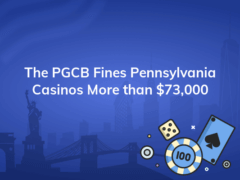The PA Gambling Industry is Threatened by Skill Games, According to Economist Frank Gamrat
 1.2K
1.2K

In a brief released last week, Frank Gamrat, Ph.D., Executive Director of the Allegheny Institute for Public Policy, expressed his opinion that Pennsylvania’s skill games “may threaten” the gaming industry.
Disapproving of skill games is not unusual. Due to the absence of consumer protection and the revenue that skill games take away from physical casinos and online casinos in PA, a number of legislators and organizations are opposed to them.
However, others, like Governor Josh Shapiro, are trying to tax and regulate skill games.
Pennsylvania Skill Games May “Make a Dent” in Casino Slot Revenue
A three-page policy brief outlining Pennsylvania’s gaming laws was released by Gamrat. The Keystone State set a new high for gambling income last year, bringing in around $5.7 billion. The stats speak for themselves.
In spite of the thriving sector, Pennsylvania may face two problems in the near future, according to Gamrat. He starts out by talking about the contentious subject of skill games.
Since Pennsylvania does not regulate or tax skill games, machine income is not taken into account. Gamrat said that if skill games stay in the gray area, it may lead to some competition. According to him, there are around 25,000 retail slot machines in licensed casinos in the state, compared to an estimated 15,000 skill games. The retail slot figures may begin to show some wear and tear with skill games.
While Gamrat saw skill games as one problem, he also mentioned Pennsylvania’s declining population, which has been expected to be down 10,400 since 2020, particularly in the state’s two biggest counties, Philadelphia (-16,300) and Allegheny (-7,800). Gaming revenues may begin to decline if Pennsylvania’s population declines persist.
In spite of the two problems mentioned by Gamrat, Pennsylvania casinos brought in $2.5 billion from slot machines last year, the most since the Pennsylvania Gaming Control Board (PGCB) began keeping count in 2013.
















